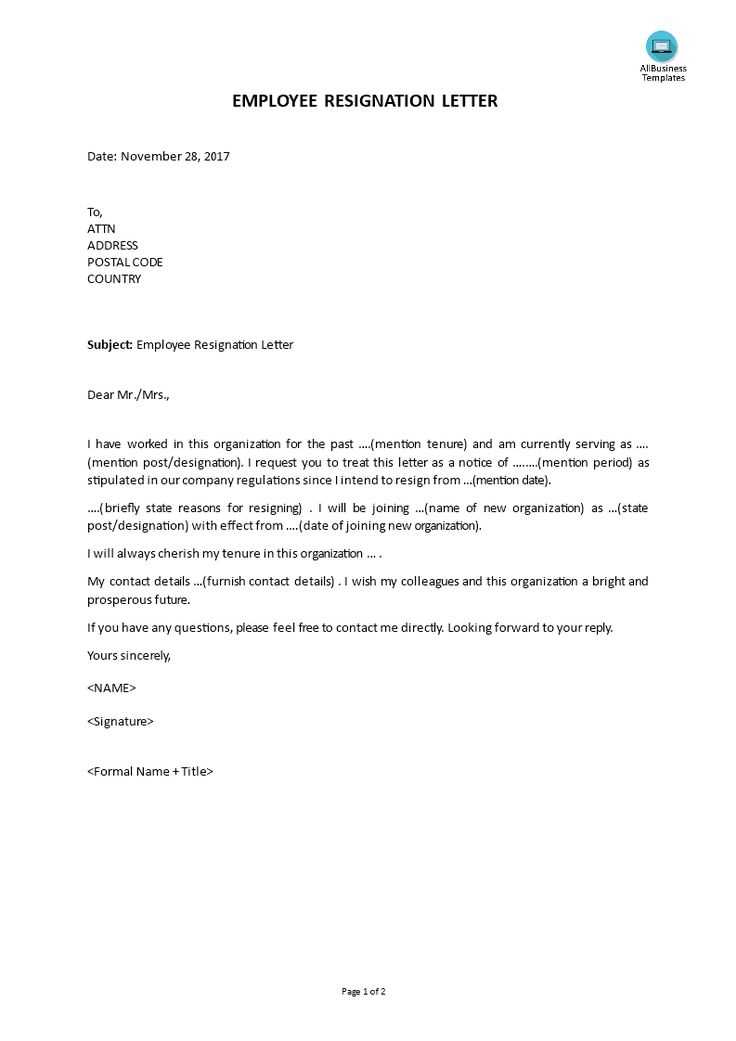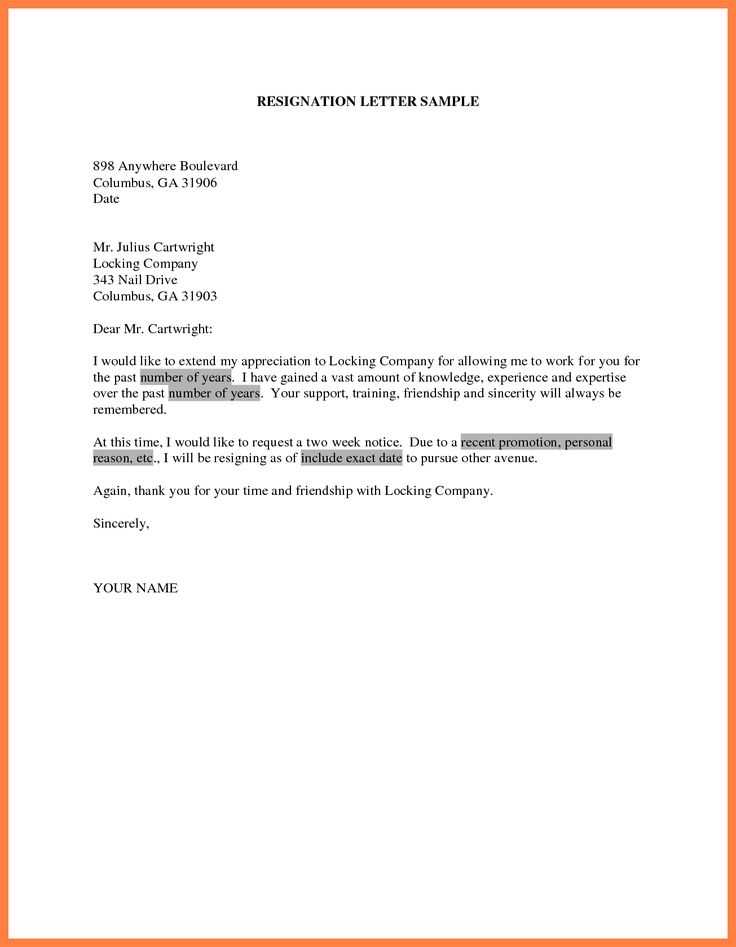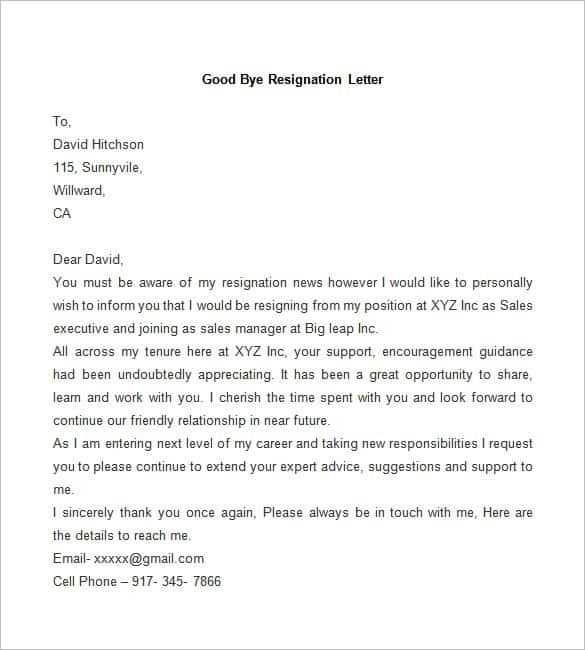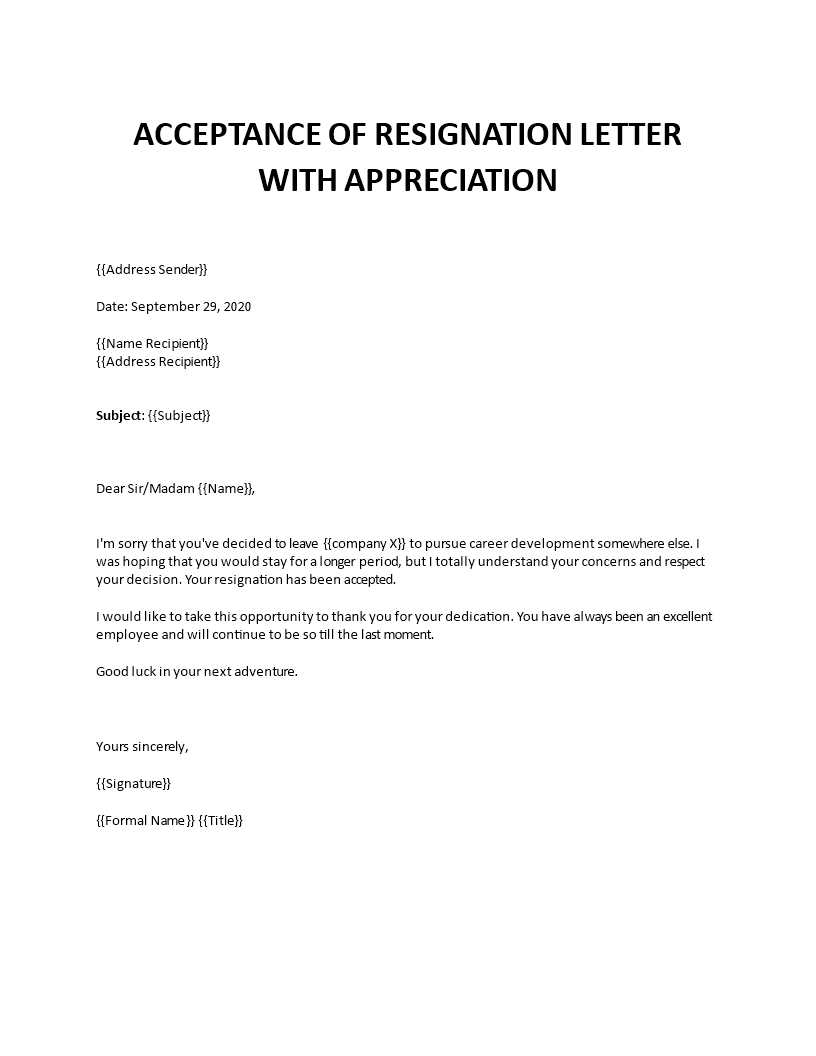Appreciative Resignation Letter Template for Professionals

When it’s time to move on from a job, the way you part with your employer matters. Leaving a positive and professional impression can ensure a smooth transition and preserve your relationships. A thoughtful farewell note serves as a reflection of your appreciation for the opportunities you’ve had and the colleagues you’ve worked with. It’s more than just an announcement of departure; it’s about expressing gratitude and goodwill.
Writing a message that conveys thanks while maintaining professionalism is crucial. It’s important to highlight your positive experiences and acknowledge the support you received during your time at the company. Whether you’re moving to a new role or simply seeking a change, your departure should feel like a step forward, both for you and your employer.
Crafting this message carefully ensures you leave behind a lasting impression. It also helps to keep doors open for future opportunities and referrals, as leaving on good terms can make all the difference in your professional network.
Why Write an Appreciative Resignation Letter

When stepping away from a role, it’s essential to leave on good terms, showing respect and gratitude to the company and your colleagues. A well-crafted farewell message can reflect your professionalism and help maintain positive relationships, which can be valuable in the future. This type of communication ensures your departure is seen as a thoughtful decision rather than a simple exit.
Writing a message of thanks and appreciation serves several purposes:
- Maintains Professionalism: A respectful and well-written note signals maturity and professionalism, ensuring your exit is seen positively.
- Strengthens Connections: By acknowledging your experience and expressing gratitude, you reinforce valuable connections within the workplace.
- Opens Future Opportunities: Leaving on a high note leaves the door open for potential future collaborations, references, or networking possibilities.
- Fosters Positive Reputation: Your departure will be remembered with respect, helping you preserve your professional image and reputation.
By taking the time to express your thanks and recognition, you show the company that you value your time there and are leaving with a positive outlook. This simple act can make a lasting impression that benefits both parties moving forward.
Key Elements of a Resignation Letter
When deciding to leave a position, it’s important to ensure your departure is communicated effectively and professionally. A well-structured message not only informs your employer but also highlights your respect for the role and the people you’ve worked with. There are several essential components to include that will ensure your message is clear, respectful, and gracious.
First, it’s important to start with a clear statement of your decision to leave the position. This sets the tone for the rest of your message and provides the necessary information right from the beginning.
Second, a paragraph expressing your gratitude is essential. Mentioning the skills, opportunities, and experiences you’ve gained while working in the company can leave a positive impression and show that you value your time there.
Additionally, make sure to specify your final working day. Giving adequate notice allows for a smoother transition and helps the company plan for the change. This is a sign of professionalism and respect for the business operations.
Finally, offering your assistance during the transition process can be a great way to show goodwill. Whether you’re available for training your replacement or wrapping up ongoing projects, this gesture helps ensure the company’s continued success after your departure.
How to Express Gratitude Professionally

Expressing appreciation in a workplace setting requires careful wording and sincerity. Whether you’re thanking colleagues, supervisors, or the company as a whole, the goal is to communicate genuine gratitude without sounding overly emotional or insincere. A well-crafted message of thanks should reflect your respect and acknowledgment of the opportunities you’ve had.
Here are some key points to consider when expressing thanks in a professional manner:
- Be Specific: Highlight particular experiences, projects, or skills you gained. This shows genuine appreciation rather than a generic statement.
- Maintain a Positive Tone: Even if you’re leaving due to challenges, focus on the positive aspects of your role and the growth you experienced.
- Use Formal Language: Keep the language professional and courteous. Avoid casual phrases that could be interpreted as unprofessional.
- Avoid Over-Complimenting: While it’s important to show gratitude, excessive flattery may seem insincere. Be balanced in your praise.
- End on a Positive Note: Conclude with best wishes for the company’s future and your hope for continued success for the team and organization.
By following these tips, you can convey your thanks effectively while maintaining professionalism and respect. Your farewell message will reflect positively on your character and contribute to a smooth and amicable transition.
How to Express Gratitude Professionally
When leaving a job, it’s crucial to communicate your appreciation in a way that reflects your professionalism and respect for the organization. A well-expressed thank you not only strengthens relationships but also leaves a positive impression on both your colleagues and employer. There are several effective ways to show gratitude that will maintain your reputation and build goodwill.
To express thanks in a professional manner, consider the following approaches:
- Be Specific: Instead of general statements, mention particular experiences, projects, or mentorships that you are grateful for. This shows that you truly value your time and efforts invested in the role.
- Keep the Tone Positive: Focus on the positive aspects of your experience, even if there were challenges. Acknowledging growth and learning opportunities emphasizes your appreciation for personal and professional development.
- Personalize Your Message: Tailor your gratitude to the individual or team who made a significant impact on your career. A personalized note adds sincerity and strengthens your relationships.
- Stay Brief and Respectful: Avoid lengthy paragraphs. Keep your expressions of thanks concise, ensuring that your message is clear and impactful without being overdone.
By following these principles, you can convey your gratitude in a way that leaves a lasting, positive mark on your professional network.
Benefits of Leaving on Good Terms

Departing from an organization amicably can have a lasting positive impact on both personal and professional growth. Maintaining respectful and cordial relationships during the exit process creates opportunities for future collaboration and preserves your reputation. It is essential to exit gracefully to ensure that both parties part ways without any lingering negativity.
One of the key advantages of leaving in a professional manner is the opportunity for future references. A positive departure ensures that former colleagues and supervisors will likely view you favorably, making them more inclined to provide strong recommendations or endorsements in the future. This can be particularly valuable when seeking new employment or business partnerships.
Additionally, leaving on good terms allows for a smoother transition for both you and the company. By handling the departure professionally, you demonstrate respect for the organization and the team, making it easier for your successor to step into your role. This level of consideration can create a legacy of professionalism that benefits everyone involved.
Furthermore, a respectful exit helps in preserving your network. The connections you have built throughout your tenure remain intact, offering valuable support and opportunities long after you’ve moved on. This network can play a crucial role in your career progression, potentially opening doors to new ventures, collaborations, or job opportunities.